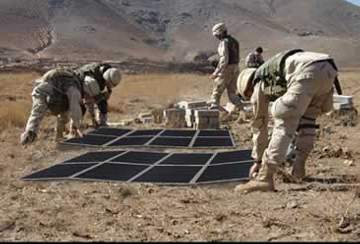
When it comes to technological innovation, the US Army often leads the way. There was the Internet, spawned by DARPAnet in the early 90s, or the Jeep in the 1940s. Off-Grid and Micro-Grid power is the Next Big Thing for the US military.
The Department of Defense Micro-Grid Development Project will be used to develop standards for the U.S. Army’s effort on the Energy Surety Micro-Grid Program – a plan to make all battlefield troops energy self-sufficient. Research efforts will focus on evaluation of micro-grid technologies to provide off-grid, islanded power to specified areas. The military says it is is pursuing opportunities in renewable energy systems as a way to reduce energy costs, shorten supply lines, and improve force protection, and has already implemented several green initiatives.
With the Micro-Grid system the Army hopes to increase efficiency, cut fuel consumption by up to 60 percent and decrease the number and/or size of the generators it currently uses. The Micro-Grid can also interface and control legacy generators and provide electrical energy autonomy in remote locations and improve power availability.
The mobility of the Micro-Grid is also expected to improve warfighter safety in remote locations because of reduced fuel consumption, which decreases the number of convoys needed, according to Honeywell which is pursuing a separate pilot program at Wheeler Air Base, Hawaii.
Fort Sill in Oklahoma will be the site for a 500 KW/hour energy generation and storage system, led by the U.S. Army Engineer Research and Development Center and the Construction Engineering Research Laboratory.
The technology has been subcontracted to the Eaton Corporation, which is itself subcontracting to suppliers like battery manufacturer ZBB which has announced it will be supplying a new kind of Zinc Bromide flow battery.
It is “constructed from environmentally-friendly materials that provide for long service life and advanced performance when compared with traditional chemical batteries,” says the PR puff.
Eaton’s Major Projects group and the Eaton Innovation Center’s design team will define operational standards for advanced energy storage systems on micro-grids such as this project and for use at future US DoD facilities.

2 Responses
Jerry, the Taliban and Al Qeada aren’t really known for their aerial bombing capabilities, but it probably would be more prudent to make it hard to see.
Uh, how are they going to camouflage it? Any idiot enemy flying overhead will see the panelling and bomb the *^$% out of it. End of whatever it’s powering.